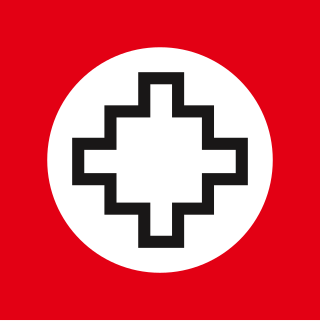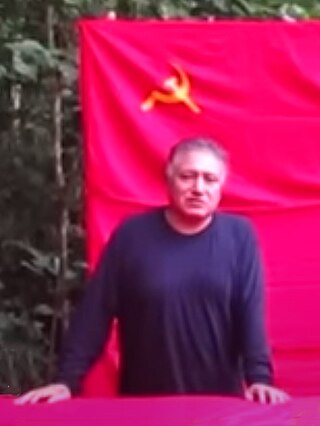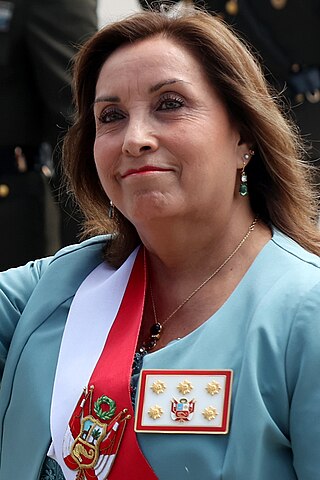
The Shining Path, self-named the Communist Party of Peru, is a far-left political party and guerrilla group in Peru, following Marxism–Leninism–Maoism and Gonzalo Thought. Academics often refer to the group as the Communist Party of Peru – Shining Path to distinguish it from other communist parties in Peru.

Manuel Rubén Abimael Guzmán Reynoso, also known by his nom de guerreChairman Gonzalo, was a Peruvian Maoist guerrilla leader and convicted terrorist. He founded the organization Communist Party of Peru – Shining Path (PCP-SL) in 1969 and led a rebellion against the Peruvian government until his capture by authorities in 12 September 1992. He was subsequently sentenced to life imprisonment for terrorism and treason.

The National Liberation Army is a Marxist–Leninist guerrilla insurgency group involved in the continuing Colombian conflict, which has existed in Colombia since 1964. The ELN advocates a composite communist ideology of Marxism-Leninism and liberation theology. In 2013, it was estimated that the ELN forces consisted of between 1,380 and 3,000 guerrillas. According to former ELN national directorate member Felipe Torres, one fifth of ELN supporters have taken up arms. The ELN has been classified as a terrorist organization by the governments of Colombia, the United States, Canada, New Zealand, and the European Union.

The Ethnocacerist movement is a Peruvian ethnic nationalist movement that espouses an ideology called ethnocacerism. The movement seeks to establish a dictatorship of the proletariat led by the country's Indigenous communities and their descendants. It draws on the ideas and history of several Indigenous and anti-colonial movements, including those of Juan Velasco Alvarado, Evo Morales, Gamal Abdel Nasser, Muammar Gaddafi, and Che Guevara. Ethnocacerism is considered an Indigenist ideology and is currently represented in electoral politics by the Union for Peru party and other smaller parties. The ideology is also followed by Peruvian militant groups such as the Plurinational Association of Tawantinsuyo Reservists and Ejército de Reservistas Andino Amazónico – T.
The Western Bloc of the Revolutionary Armed Forces of Colombia was the smallest of the Revolutionary Armed Forces of Colombia's (FARC) blocs in size, although not in military capability. It was often held responsible for attacks that occurred in Cali and the surrounding area. The specific divisions of the group are arguable. Some of its divisions or fronts, as they were commonly known as, are shown below. Many of these fronts worked together at times towards a certain mission, while others were further divided into columns and companies with a smaller number of members. For more general information, see FARC-EP Chain of Command.
The Southern Bloc of the FARC-EP was the first bloc of the Revolutionary Armed Forces of Colombia to exist and is where the roots of the guerrilla movement lie. The bloc has been held responsible for several notorious attacks, including the infamous "donkey-bomb", numerous attacks against military bases, as well as Íngrid Betancourt´s kidnapping. It was also blamed by government investigators and prosecutors for the bombing of the El Nogal club. FARC itself denied that any of its members were responsible for the attack.
The Central Bloc of the Revolutionary Armed Forces of Colombia operated strategically in the Andes Mountains, around the middle of Colombia. The group was considered as the largest threat to Bogotá and its economy, as it operated in areas surrounding the capital. Strong military action in the 2000s, however, forced the bloc to hide in remote parts of the mountains, away from many highways and cities.

The Peruvian conflict is an ongoing armed conflict between the Government of Peru and the Maoist guerilla group Shining Path and its remnants. The conflict began on 17 May 1980, and from 1982 to 1997 the Túpac Amaru Revolutionary Movement waged its own insurgency as a Marxist–Leninist rival to the Shining Path.

Comrade José is a Peruvian communist militant, leader of the Militarized Communist Party of Peru, an offshoot of the Marxist–Leninist–Maoist guerrilla Shining Path. The group is present in the VRAEM region.
José María Maguregui Ibarguchi was a Spanish football midfielder and coach.
Marxism–Leninism–Maoism (MLM) is a political philosophy that synthesizes and builds upon Marxism–Leninism and the thought of Mao Zedong. Marxism–Leninism–Maoism was first formalized by the Shining Path in 1982.

José Luis Martínez-Almeida Navasqüés is a Spanish state lawyer and politician. A member of the People's Party (PP), he has been a member of the Madrid City Council since 2015 and has been Mayor of Madrid since 2019.

The San Miguel del Ene attack was a massacre on 23 May 2021 in San Miguel del Ene, a rural area in the Vizcatán del Ene District of Satipo Province in Peru, in which 18 people were killed. The massacre was most likely perpetrated by the Militarized Communist Party of Peru (MPCP), a split of the Maoist terrorist organization Shining Path. The attack occurred in the Valle de los Ríos Apurímac, Ene y Mantaro (VRAEM) conflict region, where the group operates.

The Militarized Communist Party of Peru is a political party and militant group in Peru that follows Marxism–Leninism–Maoism and participates in the communist insurgency in Peru. It is considered a terrorist organization by the government of Peru. The MPCP operates primarily in the VRAEM area and is involved in the area's coca production. Comrade José has been the leader of the MPCP since its official creation in 2018 after its final split from the declining Shining Path guerilla group.

Dina Ercilia Boluarte Zegarra is a Peruvian politician, civil servant, and lawyer currently serving as the President of Peru since 7 December 2022. She had served as the first vice president and minister at the Ministry of Development and Social Inclusion under President Pedro Castillo. She served as an officer at the National Registry of Identification and Civil Status (RENIEC) from 2007 until 2022.
Guillermo Bermejo Rojas is a Peruvian politician. He was elected for the Congress of Peru for the 2021-2026 period.
The Young Pioneers was a name given to children born or residing within territories controlled by the Communist Party of Peru-Shining Path, a designated terrorist group by the state of Peru. This name was also given to youth that were forced to be integrated into the revolutionary program during the course of the Shining Path's "people's war."

People's Aid was a Peruvian mass organization formed by the insurgent Communist Party of Peru-Shining Path; purposed to provide legal defense to members and associates accused by the state for crimes such as terrorism. It also provided logistical and medical support.

The Plurinational Association of Tawantinsuyo Reservists (ASPRET) is an ethnonationalist paramilitary group, active in the VRAEM conflict zone in Peru. The group is led by Eddy Villarroel Medina, also known as "Comandante Sacha," a former member of the Peruvian Armed Forces. ASPRET's primary objective is to gain political power, and overthrow the Peruvian state. Members of the group call themselves the "guardians of the people" and have participated in riots in Oxapampa and Puerto Bermudez. ASPRET has an alliance with the Militarized Communist Party of Peru from 2017. The group has also been accused of being connected to Hezbollah, which it denies. Many members of the movement are armed forces veterans of Peru's internal wars or the border disputes with Ecuador in the 1980s and 1990s.











